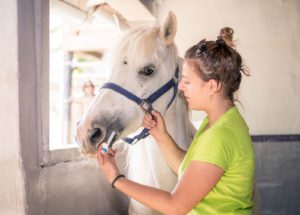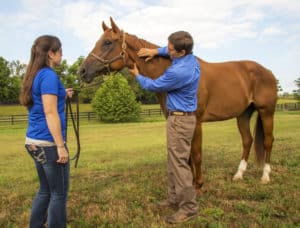
Parasites in Horses: Managing Common ‘Worms’
Learn about the lifecycles of common found parasites in horses and how to manage them.

Learn about the lifecycles of common found parasites in horses and how to manage them.

By paying close attention to when and where it occurs and any additional clinical signs, you can help your veterinarian find the cause of and cure for your horse’s cough.

Nails that have punctured the bottom of a horse’s hoof, sometimes called “street nails,” require careful veterinary inspection and treatment. Here’s what to know.

The steps owners should take if they suspect a horse has colic depend on the severity of the signs. Here’s what to know.

Dr. Annette McCoy explains how horse color is a great example of something called “simple inheritance.”

Reproductive health, vaccination status, and nutrition are key to readying your mare to care for her foal.

Spring grass might be delicious for horses, but it can cause problems including laminitis and fescue toxicity.

Owners should watch senior horses closely for signs of decline and contact their veterinarians if problems arise.

Learn how to make changes around the barn to reduce horses’ likelihood of developing respiratory disease.

Diet, exercise, biomechanics, and genetics all play a role in disease development, researchers say.

Veterinarians use equine rehabilitation to restore the normal function following injury while reducing clinical signs and restoring range of motion.

Dr. Pamela Wilkins offers recommendations for horse safety in extreme winter conditions, including providing shelter, warm water, and protecting older horses.
Whether a horse is on the operating table for colic or a broken bone, pain management after surgery is critical.
Stay on top of the most recent Horse Health news with
© 2022 Copyright Statement dolor sit amet, consetetur sadipscing User Terms, sed diam nonumy eirmod tempor invidunt ut labore et dolore magna aliquyam erat, sed diam voluptua. At vero eos et accusam et justo duo dolores et ea rebum. Stet clita kasd gubergren, no sea takimata sanctus est Lorem ipsum dolor sit amet.